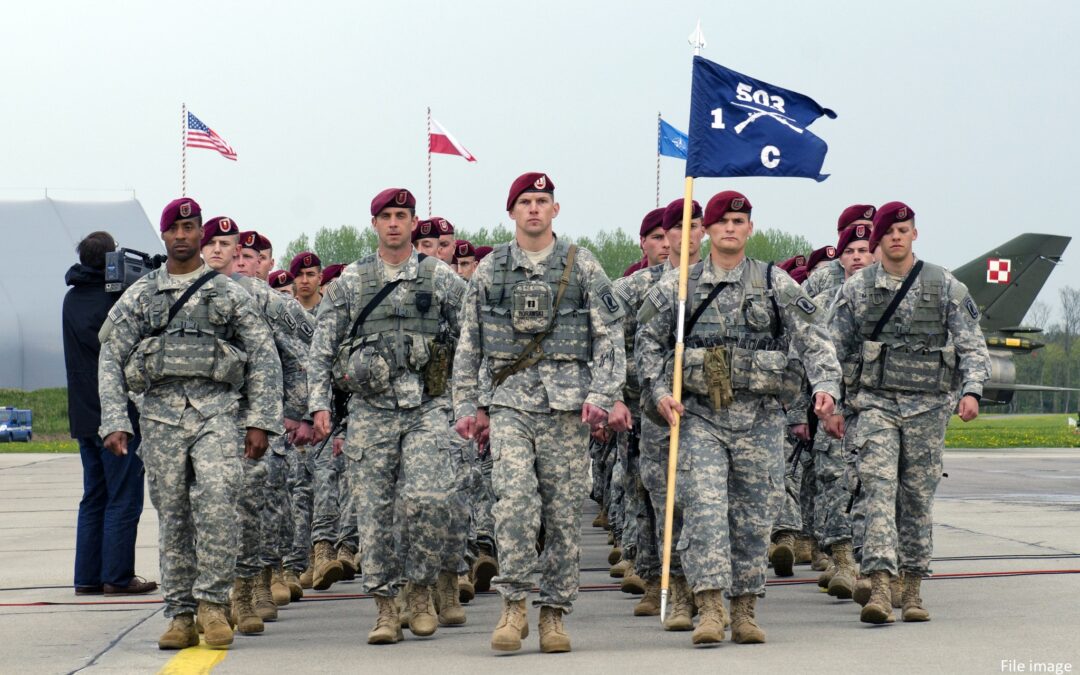An American preparatory group has arrived in Poland ahead of the deployment of 1,700 US troops to the country, as Washington seeks to bolster NATO’s eastern flank amid growing tensions with Russia over Ukraine.
Meanwhile, Poland’s foreign minister, Zbigniew Rau, has arrived in Washington, where he will meet with US Secretary of State Antony Blinken and is expected to lobby for the rotational troop deployment to be made more permanent.
On Wednesday, the Pentagon announced that it was sending an additional 2,000 troops to Poland and Germany, with a further 1,000 redeploying from Germany to Romania.
NEWS: U.S. to Deploy 3,000 Troops to Romania, Poland, Germany. https://t.co/r91gUrowp8
— Department of Defense 🇺🇸 (@DeptofDefense) February 2, 2022
Last night, Poland’s defence minister, Mariusz Błaszczak, announced that work was underway to receive a Brigade Combat Team from the 82nd Airborne Division of the US Army.
“There is already a preparatory group in Poland,” tweeted Błaszczak, posting photos of soldiers unloading equipment from a C-130 Hercules transport aircraft. He also revealed that Poland is expecting to receive 1,700 US soldiers.
“This is a clear signal of allied solidarity in response to the situation in Ukraine,” added the defence minister.
Trwa przygotowanie do przyjęcia sił głównych Brygadowej Grupy Bojowej z 82. Dywizji Powietrznodesantowej 🇺🇸. W 🇵🇱 jest już grupa przygotowawcza. Łącznie w ramach przerzutu przybędzie 1700 żołnierzy. To wyraźny sygnał sojuszniczej solidarności w odpowiedzi na sytuację na Ukrainie. pic.twitter.com/hvXX93kEuH
— Mariusz Błaszczak (@mblaszczak) February 3, 2022
Amid growing tensions with Russia, the US last week put 8,500 troops on alert to potentially bolster NATO’s rapid response force in the case of an escalation
The Pentagon has, however, flagged that the latest deployments “are not permanent moves” and would “respond to conditions.” Poland’s government has long sought for the rotational presence in the country to become more of a permanent fixture.
To that end, Rau is today expected to discuss the troops’ status with Blinken, as well as possible sanctions against Russia.
Min. @RauZbigniew rozmawiał dziś z Sekretarzem Stanu 🇺🇸 @SecBlinken, Sekretarzem Generalnym NATO @jensstoltenberg oraz Wysokim Przedstawicielem UE 🇪🇺 @JosepBorrellF.
Tematem rozmowy była sytuacja bezpieczeństwa w Europie, w tym zagrożenie płynące ze strony Rosji. pic.twitter.com/wgQfFjxmxK
— Ministerstwo Spraw Zagranicznych RP 🇵🇱 (@MSZ_RP) February 1, 2022
Rau said he expected the reestablishment of strategic dialogue – including on topics of energy security and nuclear power – which had “been suspended in the last three years,” reports the Polish Press Agency (PAP).
Speaking at the Polish embassy in Washington on Thursday, the foreign minister said that “the awareness that NATO’s eastern flank needs to currently be strengthened” was now “dominant”. But this would be “primarily in terms of what we call deterrence”, he added.
“It’s natural that Polish diplomacy is looking to broaden the allied presence in the form of a permanent rotation,” Marcin Przydacz, a deputy foreign minister, told Reuters. “The current security situation means the need to strengthen this policy of deterrence is even more pressing.”
In a speech to the Helsinki Commission in Washington in his role as the current OSCE chairman, Rau said that an escalation of the situation in Ukraine could lead to the most serious crisis in Europe since the Second World War. He added, however, that this could be averted through unity of the international community, reports PAP.
Earlier this week, Poland’s prime minister, Mateusz Morawiecki, travelled to Kyiv for talks on a new trilateral security agreement with Ukraine and the United Kingdom.
Poland has offered to provide Ukraine with “defensive” ammunition amid growing concerns over what Morawiecki called “Russian neo-imperialism”. Warsaw has also announced that it is ready to receive up to a million Ukrainian refugees if war breaks out.
Main image credit: Sgt. A.M. LaVey/US Army Europe (under public domain)

Maria Wilczek is deputy editor of Notes from Poland. She is a regular writer for The Times, The Economist and Al Jazeera English, and has also featured in Foreign Policy, Politico Europe, The Spectator and Gazeta Wyborcza.




















